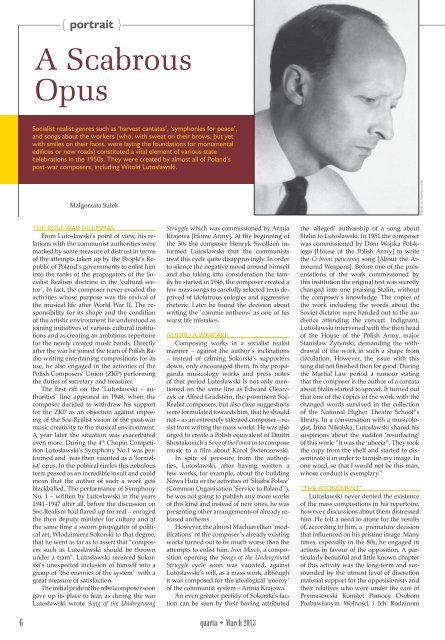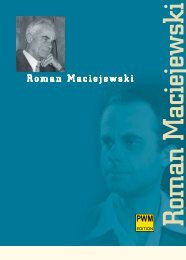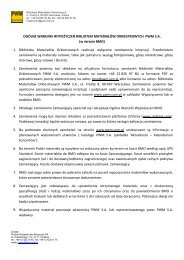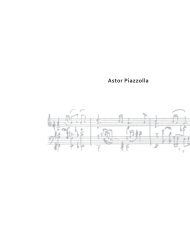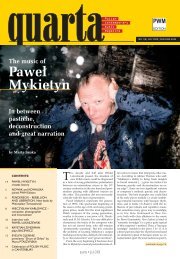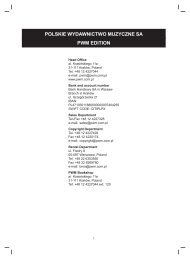On Paweł Łukaszewski's music
On Paweł Łukaszewski's music
On Paweł Łukaszewski's music
Create successful ePaper yourself
Turn your PDF publications into a flip-book with our unique Google optimized e-Paper software.
{ portrait }<br />
A Scabrous<br />
Opus<br />
Socialist realist genres such as ‘harvest cantatas’, ‘symphonies for peace’,<br />
and songs about the workers (who, with sweat on their brows, but yet<br />
with smiles on their faces, were laying the foundations for monumental<br />
edifices or new roads) constituted a vital element of various state<br />
celebrations in the 1950s. They were created by almost all of Poland’s<br />
post-war composers, including Witold Lutosławski.<br />
Małgorzata Sułek<br />
Photo: K. Komorowski<br />
THE POST-WAR DILEMMAS<br />
From Lutosławski’s point of view, his relations<br />
with the communist authorities were<br />
marked by some measure of distrust in terms<br />
of the attempts taken up by the People’s Republic<br />
of Poland’s governments to enlist him<br />
into the ranks of the propagators of the Socialist<br />
Realism doctrine in the ‘cultural sector’.<br />
In fact, the composer never evaded the<br />
activities whose purpose was the revival of<br />
the <strong>music</strong>al life after World War II. The responsibility<br />
for its shape and the condition<br />
of the artistic environment he understood as<br />
joining initiatives of various cultural institutions<br />
and as creating an ambitious repertoire<br />
for the newly created <strong>music</strong> bands. Directly<br />
after the war he joined the team of Polish Radio<br />
writing entertaining compositions for its<br />
use, he also engaged in the activities of the<br />
Polish Composers’ Union (ZKP) performing<br />
the duties of secretary and treasurer.<br />
The first rift on the ‘Lutosławski – authorities’<br />
line appeared in 1948, when the<br />
composer decided to withdraw his support<br />
for the ZKP as an objection against imposing<br />
of the Soc-Realist vision of the post-war<br />
<strong>music</strong> creativity to the <strong>music</strong>al environment.<br />
A year later the situation was exacerbated<br />
even more. During the 4 th Chopin Competition<br />
Lutosławski’s Symphony No.1 was performed<br />
and was then vaunted as a ‘formalist’<br />
opus. In the political circles this nebulous<br />
term passed as an incredible insult and could<br />
mean that the author of such a work gets<br />
blackballed. The performance of Symphony<br />
No. 1 – written by Lutosławski in the years<br />
1941–1947 after all, before the discussion on<br />
Soc-Realism had flared up for real – enraged<br />
the then deputy minister for culture and at<br />
the same time a sworn propagator of political<br />
art, Włodzimierz Sokorski to that degree,<br />
that he went as far as to assert that “composers<br />
such as Lutosławski should be thrown<br />
under a tram”. Lutosławski received Sokorski’s<br />
unexpected inclusion of himself into a<br />
group of ‘the enemies of the system’ with a<br />
great measure of satisfaction.<br />
The initial pride of the rebel composer soon<br />
gave up its place to fear, as during the war<br />
Lutosławski wrote Song of the Undergroung<br />
Struggle which was commissioned by Armia<br />
Krajowa [Home Army]. At the beginning of<br />
the 50s the composer Henryk Swolkień informed<br />
Lutosławski that the communists<br />
treat this cycle quite disapprovingly. In order<br />
to silence the negative mood around himself<br />
and also taking into consideration the family<br />
he started in 1946, the composer created a<br />
few mass songs to carefully selected texts deprived<br />
of idolatrous eulogies and aggressive<br />
rhetoric. Later he found the decision about<br />
writing the ‘commie anthems’ as one of his<br />
worst life mistakes.<br />
GUERILLA WARFARE<br />
Composing works in a socialist realist<br />
manner – against the author’s inclinations<br />
– instead of calming Sokorski’s supporters<br />
down, only encouraged them. In the propaganda<br />
<strong>music</strong>ology works and press notes<br />
of that period Lutosławski is not only mentioned<br />
on the same line as Edward Olearczyk<br />
or Alfred Gradstein, the prominent Soc-<br />
Realist composers, but also clear suggestions<br />
were formulated towards him, that he should<br />
not – as an extremely talented composer – resist<br />
from writing the mass works. He was also<br />
urged to create a Polish equivalent of Dmitri<br />
Shostakovich’s Song of the Forest or to compose<br />
<strong>music</strong> to a film about Karol Świerczewski.<br />
In spite of pressure from the authorities,<br />
Lutosławski, after having written a<br />
few works, for example, about the building<br />
Nowa Huta or the activities of ‘Służba Polsce’<br />
(Common Organisation ‘Service to Poland’ 1 ),<br />
he was not going to publish any more works<br />
of this kind and instead of new ones, he was<br />
presenting other arrangements of already released<br />
anthems.<br />
However, the almost Machiavellian ‘modifications’<br />
of the composer’s already existing<br />
works turned out to be much worse than the<br />
attempts to enlist him. Iron March, a composition<br />
opening the Songs of the Underground<br />
Struggle cycle soon was vaunted, against<br />
Lutosławski’s will, as a mass work, although<br />
it was composed for the idealogical ‘enemy’<br />
of the communist system – Armia Krajowa.<br />
An even greater perfidy of Sokorski’s faction<br />
can be seen by their having attributed<br />
the ‘alleged’ authorship of a song about<br />
Stalin to Lutosławski. In 1951 the composer<br />
was commissioned by Dom Wojska Polskiego<br />
[House of the Polish Army] to write<br />
the O broni pancernej song [About the Armoured<br />
Weapons]. Before one of the presentations<br />
of the work commissioned by<br />
this institution the original text was secretly<br />
changed into one praising Stalin, without<br />
the composer’s knowledge. The copies of<br />
the work including the words about the<br />
Soviet dictator were handed out to the audience<br />
attending the concert. Indignant,<br />
Lutosławski intervened with the then head<br />
of the House of the Polish Army, major<br />
Stanisław Żytyński, demanding the withdrawal<br />
of the work in such a shape from<br />
circulation. However, the issue with this<br />
song did not finished then for good. During<br />
the Martial Law period a rumour stating<br />
that the composer is the author of a cantata<br />
about Stalin started to spread. It turned out<br />
that one of the copies of the work with the<br />
changed words survived in the collection<br />
of the National Higher Theatre School 2 ’s<br />
library. In a conversation with a <strong>music</strong>ologist,<br />
Irina Nikolska, Lutosławski shared his<br />
suspicions about the sudden ‘resurfacing’<br />
of this work: “it was the ‘ubecja 3 ’. They took<br />
the copy from the shelf and started to disseminate<br />
it in order to tarnish my image. In<br />
one word, so that I would not be this man,<br />
whose conduct is exemplary.”<br />
“THE ATONEMENT”<br />
Lutosławski never denied the existence<br />
of the mass compositions in his repertoire,<br />
however, discussions about them distressed<br />
him. He felt a need to atone for the results<br />
of, according to him, a premature decision<br />
that influenced on his pristine image. Many<br />
times, especially in the 80s, he engaged in<br />
actions in favour of the opposition. A particularly<br />
beautiful and little known chapter<br />
of this activity was the long-term and surrounded<br />
by the utmost level of discretion<br />
material support for the opposisionists and<br />
their relatives who were under the care of<br />
Prymasowski Komitet Pomocy Osobom<br />
Pozbawionym Wolności i Ich Rodzinom<br />
6 quarta • March 2013


